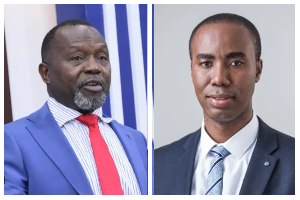STAR Ghana Foundation held a learning event from 9th to 10th March 2021 virtually via Microsoft Teams and Facebook Live to harvest lessons from its 2020 election call.
This event brought together the -28 grant partners of STAR-Ghana Foundation made up of Civil Society Organisations, Media, Faith-based organisations and Think-tanks in Ghana which participated in Phases I and II of the 2020 election call, to discuss the “Role of Civil Society in achieving credible, peaceful and inclusive elections in Ghana: Lessons from STAR-Ghana Foundation’s 2020 Elections Call”.
The learning event is the first since the end of the transition from the 10-year STAR-Ghana Programme into STAR-Ghana Foundation. The event was held against the backdrop of declining donor support particularly support for governance programmes and election activities.
The event provided a platform for STAR-Ghana Foundation and its 28 grant partners to reflect on the Foundation’s work within the governance sector, specifically on election programming in Ghana, to:
● Identify and document learning from the Foundation’s election 2020 workstream including its contribution to credible, peaceful and inclusive election;
● Identify entry points for improving the effectiveness of civil society on elections programming in Ghana;
● Contribute to the development of the next phase of the grants support based on lessons harvested from the current phases.
A discussion paper developed by Dr. Kojo Asante (Director of Advocacy and Policy Engagement at the Ghana Centre for Democratic Development) was presented at the learning event.
The discussion paper generally looked at Assessing the role of civil society in achieving credible, peaceful and inclusive elections in Ghana with specific focus on; Candidate Debates, Manifestos and Issue-based campaigning, Civic/voter education, conflict prevention and peace promotion, Election observation and Media Monitoring. The focus areas of the discussion paper were extensively discussed by the grant partners and other key stakeholders.
Having deliberated on the discussion paper, the following key highlights were brought to the fore:
o The 2020 election was the eighth consecutive election held in Ghana since 1992; which took place in approximately 38,000 polling stations across the country - an increase in the 2016 figure of about 29,000. Also, it was the first partisan national election organised by the new leadership of the Electoral Commission (EC) which took office in August 2018.
o Post-election developments included public protests over election outcomes, court litigation over parliamentary seats, and the presidential election petition.
o There is popular support for elections in Ghana. 8 out of 10 Ghanaians support elections as a means of selecting leaders.
o The 2020 elections recorded a voter turnout of 78% during a pandemic which goes to show that Ghana has always recorded high voter turnouts usually hovering around 61 to 85 percent, except for the 1992 elections.
o The seven (7) previously held elections were generally assessed to be free, fair and peaceful, with three (3) electoral turnovers, which is quite an achievement compared to what is happening in many other countries in the African continent.
o Ghana has had progressive improvement in the electoral process through electoral reforms, particularly after the 2012 election and the election petition where the Supreme Court triggered a reform process that led to the setup of an electoral reform committee that implemented 27 different reform issues. These reforms accounted for the smooth voting process we have had in 2016 and 2020, complemented by a very vibrant media space and active CSO environment.
o It is very essential to acknowledge that the support of STAR-Ghana Foundation and its development partners to civil society groups and organisations over the years have contributed immensely to these gains.
Further to the key highlights raised above, participants collectively made and agreed to these recommendations moving forward:
1. More CSO engagement with State institutions; prevent the latent perceived competition, by strengthening stakeholder buy-in, enhance the legitimacy of interventions and elicit stakeholder support.
2. More collaboration with other CSOs likely to avoid duplication of efforts, enhance the cost effectiveness of interventions, reduce stakeholder support fatigue and maximise impact.
3. Revise strategies of engagement with State institutions; accommodate some of the nuances of the engagement, understand, sometimes, their own challenges, engagement must not take the form of win-lose perspective. It’s important for the Electoral Commission to be able to deliver on its mandate and deliver it in a way that reassures and gives people confidence in the electoral system.
4. Review stakeholder engagement on observation methodologies to boost confidence in observation findings and to manage public expectations about the observation findings.
5. Observation efforts in the post-election period should also include social media monitoring.
6. Monitor implementation of vigilantism law and political parties’ code of conduct to help identify progress; intensify public education on the vigilantism law, also addressing misinformation, coordination between social media observers on the ground together with traditional media works.
7. Intensify work in other areas such as low representation of women in politics, campaign financing regime, constitutional reform, abuse of incumbency and vote buying, police accountability, and election reform particularly around results management.
Press Releases of Wednesday, 10 March 2021
Source: STAR Ghana
STAR Ghana Foundation holds on webinar on 2020 elections
Entertainment












